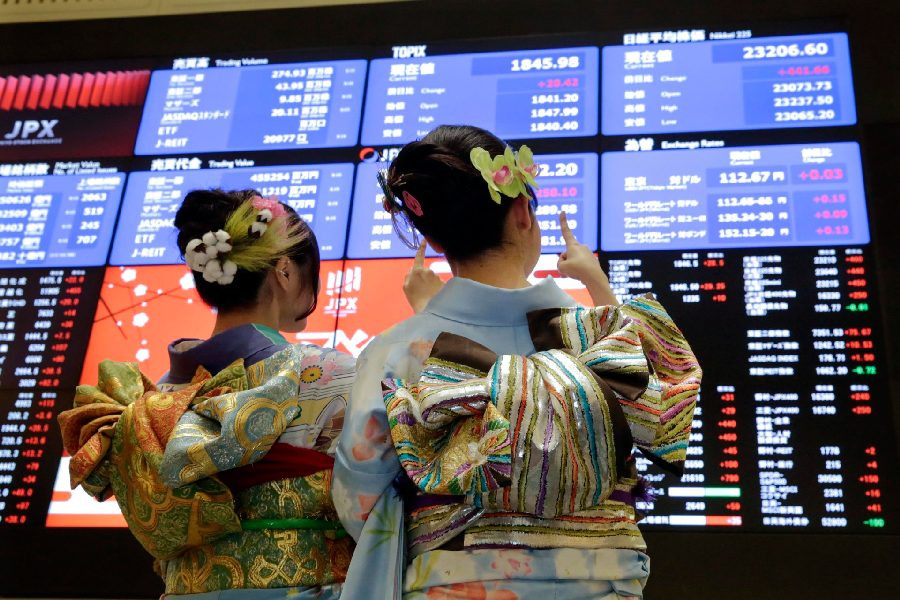
Asian stock indexes on Wednesday did not support the optimism of Wall Street. Apparently, investors' constant concerns about interest rates and inflation are gaining momentum again, especially amid Federal Reserve Chairman Jerome Powell's expected speech to Congress today. What does the market hope to hear from him? Of course, there are assurances that the central bank will be able to provide a soft landing for the American economy and curb galloping inflation. At least in early trading on Wednesday, all three major US stock indexes have already lost about 1%.
Let's be realistic – it always pays off. Apparently, including the flight of investors to safer assets, the markets are becoming less and less hopeful of a favorable way out of the crisis. However, Asian stock exchanges have their own, so to speak, regional peculiarities. And the second and third largest economies in the world generally use their own approaches to conducting monetary policy, so Asia also trades adjusted for terrain and time.
Australia
The Australian Stock Exchange is the first to open trading in the Asia-Pacific region. And it just accepts the mood of Wall Street as fully as possible. So today, after the overnight growth of the main US stock indexes over 2%, the Australian S&P/ASX 200 index also rose, but on a much smaller scale (+0.1%) and not for long. Shares of energy companies rose in price: Santos (+3.2%), Woodside Energy (+2.6%), Whitehaven Coal (+1.3%). Rio Tinto (+1.8%), Fortescue Metals (+1.0%), BHP Group (+0.8%) also rose. Trade was moving rather shakily, as fears of a global recession and a further increase in the Reserve Bank of Australia rate were growing again, which its head, we recall, called still "very low." The market also digested RBA Governor Philip Lowe's comments the day before. Lowe admitted that inflation in the country could reach 7% by the end of the year.
Japan
The minutes of the Bank of Japan's April policy meeting, published on Wednesday, also reflected concerns. Only the Japanese central bank is more concerned about not rising inflation – it is just low and growing on external factors - commodity prices. The central bank is most concerned about the sharp fall in the yen, which has a very painful effect on the business environment. Nevertheless, the BOJ intends to continue its policy of ultra-low interest rates, which it confirmed just a few hours ago. The response to the central bank's next statement on the commitment to the dovish policy was the growth of the Japanese stock market. The shares of automakers and medical companies were leading thanks to Mitsubishi Motor (+6.4%), Honda Motor (+2.7%), Toyota Motor (+1.5%), Daiichi Sankyo (+2.1%), Takeda Pharmaceutical (+1.4%). And today's drop in raw material prices has lowered the market quotes of companies related to natural resources.
China
The Chinese stock market, controlled by the iron hand of the authorities, does not get tired of surprising others. On the one hand, it is also under pressure from global economic concerns. On the other hand, Chinese benchmark indices have been holding near their highest levels for about three months, and also against expectations. Just not a global recession, but a more adaptive policy of the authorities, which should help the economy recover after the quarantine under COVID-19. So far, this expectation has not led to anything significant. And S&P downgraded the rating of the state-backed Chinese developer Greenland Holdings to selective default. Meanwhile, this development company is still struggling to cover bond payments, but to no avail. The People's Bank of China, we recall, earlier this week only suspended the easing of its policy, leaving the base rates unchanged. In anticipation of at least some clarity, some investors preferred to lock in some profits, sending the Chinese stock market sideways. The biggest losses were incurred by Goertek (-10.0%), Cd Qianfeng Electric (-4.67%), Luxshare Precision (-4.0%), Yonyou Soft (-3.62%), China Fortune (-3.36%).
New Zealand
New Zealand also closed lower, sending the stock market index to an almost 26-month low. In addition to global pessimism about the risks of recession, investor sentiment was also influenced by the pessimism of the local economic situation. The country recorded a record low level of consumer confidence (78.7), and the positive balance in May halved compared to last year (from 497 million to 263 million), so on Wednesday the shares of Eroad (-5.3%), my bag of food (-3.5%), contact energy (-3.3%) went into negative territory), Air New Zealand (-2.7%).
 English
English 
 Русский
Русский Bahasa Indonesia
Bahasa Indonesia Bahasa Malay
Bahasa Malay ไทย
ไทย Español
Español Deutsch
Deutsch Български
Български Français
Français Tiếng Việt
Tiếng Việt 中文
中文 বাংলা
বাংলা हिन्दी
हिन्दी Čeština
Čeština Українська
Українська Română
Română

